An online masters in real estate development can help you kickstart a new career path, offering the chance to collaborate with others and build dreams into reality.

Real estate developers have an opportunity to make a real difference in communities. This field includes elements of real estate, finance, law, and construction, providing insight into a variety of potential careers.
Editorial Listing ShortCode:
If you’re wanting to contribute to the future of your community and beyond, this graduate-level training can lead to a variety of opportunities.
Online Masters in Real Estate Development Programs

An online masters degree in real estate development builds upon a variety of skills that can help you pursue a range of career paths.
Real estate development relies heavily on coordinating a team of individuals to complete a job that meets everyone’s requirements. So, in your masters program, you’ll focus on communication, ethics, and a variety of policies and procedures. Organization is key in this field, along with being able to establish a clear plan of action and to coordinate resources to make that plan happen.
Editorial Listing ShortCode:
Some of the key subjects studied in masters in real estate development online programs include:
- Principles of real estate and land development
- Real estate investment analysis
- Capital markets
- Urban economics
- Community evaluation and future market sustainability
- Transit concerns and regulations
Building a community requires a lot more than eager people and available space. You’ll learn how to work with people and resources both within and outside the scope of each project to ensure it makes financial and operational sense.
A Master of Real Estate Development program can provide guidance on where to find answers for questions that arise when you’re focused on creating new opportunities.
Real Estate Development Careers & Salaries

Because of the wide range of skills you can develop when pursuing an online masters in real estate development, you may have lots of options for career paths following graduation. For example, communication is a key part of real estate development courses. This skill can be applicable to a variety of management roles, including property, real estate, or community association manager.
During your program, you can gain insight into the inner workings of how a blueprint becomes a building. If this part of land development intrigues you, you might look into becoming a construction manager. You can also utilize your new skills of finance and community economics. Common careers in this area include budget analyst, investment analyst, investment banker, and real estate broker.
According to the Bureau of Labor Statistics, those who receive a masters in real estate development can use their skills in a variety of careers, many of which bring higher than average salaries.
| Careers | Annual Median Salaries |
| Financial Managers | $131,710 |
| Construction Managers |
$98,890 |
| General and Operations Managers | $97,970 |
| Budget Analysts | $79,940 |
| Market Research Analysts | $63,920 |
| Securities, Commodities, and Financial Services Sales Agents | $62,910 |
| Real Estate Brokers | $62,010 |
| Property Appraisers and Assessors |
$61,340 |
| Property, Real Estate, and Community Association Managers | $59,230 |
| Real Estate Sales Agents | $48,340 |
The Bureau of Labor Statistics indicates that the real estate sector has experienced stability over the past few years and should continue to grow over the next ten years.
Editorial Listing ShortCode:
The financial sector has also been experiencing growth, and it has the highest concentration of workers in analyst and banker roles. In the field of real estate, it’s helpful to research any licensure requirements for your preferred career path.
Real Estate Development Masters Curriculum & Courses

Masters in real estate development online programs will vary from school to school, but the coursework will follow similar themes.
Some of the courses you take will likely include the following topics:
- Responsible Real Estate Development: You’ll learn about the social and economic impacts of real estate development.
- Market Analysis for Real Estate Development: This course helps you appreciate the importance of location as well as how to spot the right opportunity for the right spot.
- Real Estate Finance: Buying, selling, leasing, and developing all come with a price tag, and this course can help you understand real estate finance in greater detail.
- Land Development Processes: This course takes you through the steps of developing land, from feasibility to construction.
- Real Estate Technology: In this course, you’ll learn about the software and programs that help keep the development process moving smoothly.
- Place Making and Urban Building: From sustainability to economical impact and architecture, this course can teach you how to integrate your real estate dreams with urban reality.
- Real Estate Entitlements: You can’t develop without permission, and this course will help you understand how to get approval and rights for building.
- Construction and Project Management: This course ensures you know how to stay on time and under budget while managing several independent resources simultaneously.
- City Planning Economics: Building a city comes at a price, and this course can help you appreciate the money flow surrounding a community.
- Real Estate Portfolio Management: Being organized and prepared is key to maintaining a successful portfolio. This course will help you learn about investor relations, asset management, and portfolio planning.
Your courses are designed to help you learn the facets of real estate investment, financial planning, risk management, project management, and the legal ramifications of building and developing property.
Master of Real Estate Development Admissions Requirements

Criteria for online Master of Real Estate Development programs will differ from school to school, but here are some common admissions requirements:
- GRE or GMAT scores. Not all schools require graduate exams, but it’s beneficial to double check before applying so you can plan accordingly.
- Bachelor’s degree. Many schools require students to have completed a degree from an accredited college or university with a certain minimum GPA.
- Letter of intent. Your prospective school may ask you to compose a letter indicating why you wish to pursue their program and what you hope to accomplish with your degree.
- Letter of recommendation. You may be asked to share a statement of confidence from a professional or educational reference to validate your choice in course of study.
Transcripts from previous learning institutions, certifications, a resume or curriculum vitae, and an online application may also be required from applicants.
Real Estate Graduate Programs Accreditation
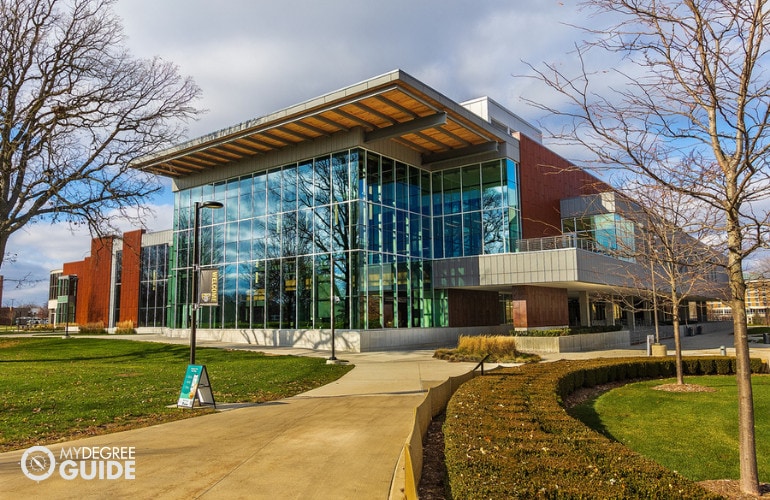
There are a number of advantages to pursuing your real estate graduate degree from a regionally accredited institution.
Editorial Listing ShortCode:
Schools that are recognized by the Council for Higher Education Accreditation (CHEA) meet a higher level of academic standards. Attending an accredited school can also be a qualifying factor for some forms of financial aid. Employers may also prefer candidates who received training at an accredited school.
Real Estate Licensure and Certifications

Real estate licensing varies from state to state, so it’s beneficial to check out the requirements and regulations of the state in which you plan to practice. Additionally, if you move or work on a project out of state during your career, you may want to be aware of what licenses or certifications are necessary.
In general, you’ll likely want to take a look at state real estate licensing, which may require an exam and a certain number of hours of real estate coursework, including real estate law classes. Depending on your career goals, you may also want to pursue a real estate appraisers license.
If you are pursuing the financial aspects of real estate development, receiving a brokers license may require additional coursework, a sponsor, and a final test to ensure you’re up to date on state regulations.
Financial Aid and Scholarships

Since the cost of each online masters program can vary, you may wish to investigate financial aid and scholarship opportunities.
The Free Application for Federal Student Aid (FAFSA) is available for all students to complete online, free of charge. The FAFSA determines your eligibility for federal aid and other forms of need-based aid. It helps to be aware of the deadlines each school may set aside for applications so that you can get yours submitted in time for the next term.
Additionally, each school may offer aid for online students, so it can be beneficial to investigate these opportunities. Schools can also offer scholarships for students depending on a variety of circumstances, such as undergraduate performance.
What Can You Do with a Masters in Real Estate Development?

According to the Bureau of Labor Statistics, real estate development graduates tend to pursue careers in finance, construction, or real estate. There are many roles available within each of these fields.
Those who wish to focus on the investment aspects of real estate development may guide clients to make wise money decisions regarding their real estate. Those who pursue the project management side of real estate development can coordinate teams to survey, analyze, and construct projects.
A masters in real estate development can help you gain greater communication, organization, and analytical skills, all of which are applicable in a variety of industries.
In a growing number of cases, graduates of masters programs choose to continue their educations and earn a PhD in Real Estate online or on campus.
How Long Does It Take to Get a Masters in Real Estate Development Online?

Most masters degrees take 1 to 2 years to complete. The two main factors impacting the length of time required to receive your degree are the program you choose and how much time you devote to your studies.
For instance, if you plan to be a full-time student, you can potentially complete a 36 credit program in 1 year if you take additional classes through summer term. Part-time students may require a longer period of time to complete their degree.
Editorial Listing ShortCode:
Additionally, some programs require students to complete a certain number of work-study or internship hours as well as a final project or thesis. These factors can also impact your time of completion.
What Is a Masters in Real Estate Good For?

Selling, purchasing, surveying, engineering, designing, constructing, financing, communicating, and organizing all come together within real estate development. This is one area where economics and architecture meet.
Nearly anyone can become involved in real estate development in some capacity. A masters of real estate can help you gain a foothold of understanding in a fast-paced, multi-discipline career path. You can connect with professionals and learn the finer points of avoiding litigation and building a community—knowledge that is necessary for success in development and related fields.
Beyond the basic buying and selling, a masters in real estate development can also lead to analytical careers, advisement roles, or management positions.
What’s the Difference Between an MBA vs. MS in Real Estate Development?

The most significant difference between earning an MBA in Real Estate online and earning a Master of Science (MS) in Real Estate Development is the focus of the program.
- Master of Business Administration: An MBA is a business-based program. This type of program will lead you through understanding the business ramifications of buying, selling, and developing—including economical impact and how to gauge profit.
- MS in Real Estate Development: This degree provides education on more than the financial aspects of real estate development. You’ll also learn about law, ethics, transportation, contracting, architecture, construction, city planning, and future planning.
The type of degree that is best for you will often depend on your professional goals.
Is a Masters in Real Estate Development Worth It?
Yes, a masters in real estate development is worth it for many students. According to the Bureau of Labor Statistics, the real estate sector is seeing stable growth, with real estate brokers and managers seeing 4% job growth and 3% job growth respectively over the next ten years.
Editorial Listing ShortCode:
Real estate development will continue to be important as long as people require buildings in which to live, conduct business, and meet. The skills you can develop through a real estate development program are also very useful in other fields. Since there are so many moving parts in land development, you might find a role that interests you in finance, investments, construction, or policy building.
Universities Offering Online Masters in Real Estate Development Degree Programs
Methodology: The following school list is in alphabetical order. To be included, a college or university must be regionally accredited and offer degree programs online or in a hybrid format.

Auburn University offers a Master of Real Estate Development. To graduate, students must complete 39 credit hours over the course of two years and six residencies. To be eligible for the program, applicants must submit an online application, recommendations, and self-reported test scores through the school’s website.
Auburn University is accredited by the Southern Association of Colleges and Schools Commission on Colleges.
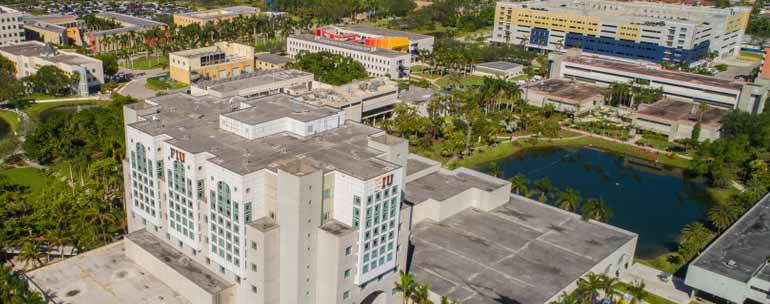
Florida International University offers an online program for a Master of Science in International Real Estate that can typically be completed in 12 months. It is designed to prepare students for ARGUS certification. Students must complete 30 credits to graduate. Applicants must have a bachelor’s degree with a GPA of 3.0 or higher and appropriate GMAT or GRE scores.
Florida International University is accredited by the Southern Association of Colleges and Schools Commission on Colleges.
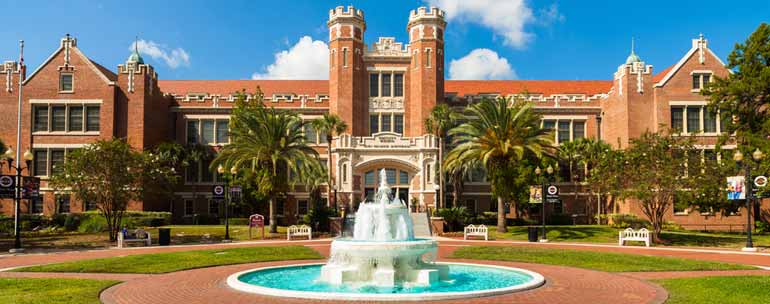
Florida State University offers a part-time Master of Business Administration with a specialization in Real Estate. To graduate, students must complete 39 online credits. To be eligible for the program, applicants must have a bachelor’s degree, a current resume with relevant work experience, and two letters of recommendation.
The Florida State University is accredited by the Commission on Colleges of the Southern Association of Colleges and Schools.
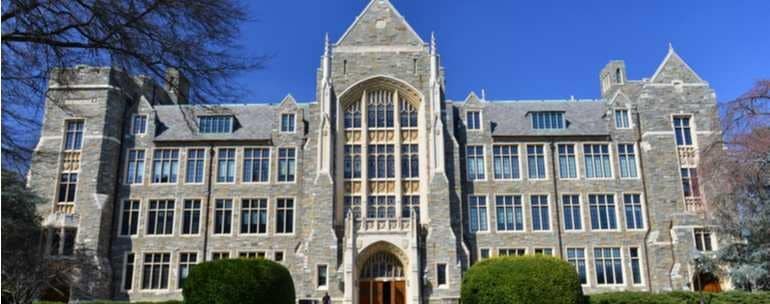
Georgetown University offers a Master of Professional Studies in Real Estate. Students must complete 33 online credits to graduate. Those interested in the program must have a bachelor’s degree to eligible. Applicants need to submit a statement of purpose, a resume, official transcripts from all schools attended, and two letters of recommendation.
Georgetown University is accredited by the Middle States Commission on Higher Education.

Georgia State University offers a Master of Business Administration with a track in Real Estate. Students need to complete 31 credit hours to graduate. Applicants must have a bachelor’s degree with a GPA of 2.5 or higher and submit official transcripts. The GMAT score requirement may be waived based on the applicant’s GPA.
Georgia State University is accredited by the Southern Association of Colleges and Schools Commission on Colleges.
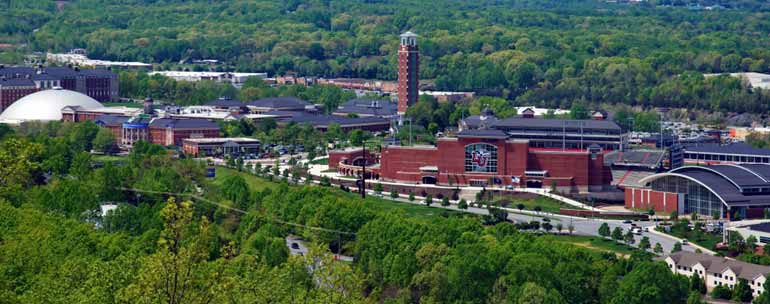
Liberty University offers a Master of Business Administration in Real Estate. Students must complete 45 credit hours to graduate. All classes can be completed online and are 8 weeks long. Applicants must have a bachelor’s degree with at least 15 hours of business credits and a minimum GPA of 3.0 to be eligible for the program.
Liberty University is accredited by the Southern Association of Colleges and Schools Commission on Colleges.

Longwood University offers a Master of Science in Commercial Real Estate. The program can be completed online and requires students to complete 10 courses to graduate. Applicants must submit an online application along with copies of their official college transcripts, a personal statement, and a resume. A video interview is also required.
Longwood University is accredited by the Southern Association of Colleges and Schools Commission on Colleges.

Temple University offers a Master of Science in Real Estate. The online real estate degree program requires 30 credit hours and a capstone project to graduate. Applicants must submit their college or university transcripts to apply. Applicants with a GPA lower than 3.0 must also submit GRE or GMAT scores.
Temple University is accredited by the Middle States Association of Colleges and Schools.
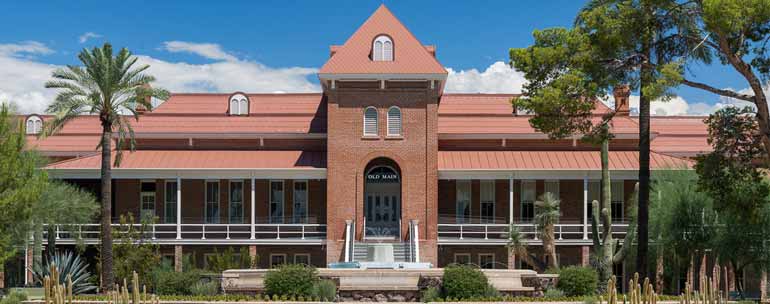
The University of Arizona offers an online Master of Real Estate Development program. Students must complete 30 credit hours to graduate. To be eligible for the program, applicants must submit an online application and copies of their official transcripts from all schools attended through the university’s website.
The University of Arizona is accredited by the Higher Learning Commission.
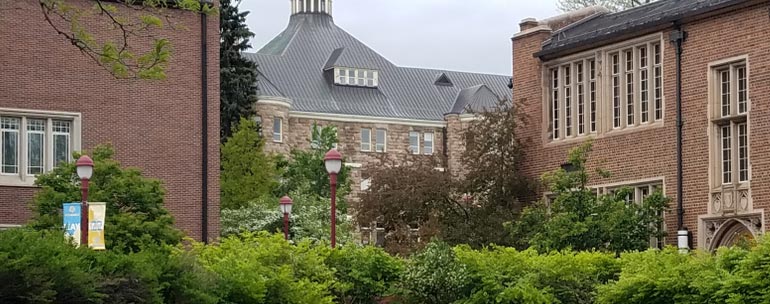
The University of Denver offers a Master of Science in Real Estate and the Built Environment. A concentration in Property Development, Real Estate, Construction Management, or Integrated Product Delivery may be added to the degree. Classes are 10 weeks long. Applicants must submit official transcripts and an academic essay.
The University of Denver is accredited by the Higher Learning Commission.
Getting Your Master’s in Real Estate Development Degree Online

If becoming involved in one of the many careers associated with a real estate development degree interests you, why wait? You can check out the variety of program options available in order to make plans to study this multi-discipline field.
Once you earn your masters degree from an accredited school, you may pursue a variety of career paths related to real estate development. The outlook for careers related to this field is positive, which may translate into plenty of opportunity once you’ve completed your degree.
If you’re interested in this field, you may want to take the time today to explore some of the online business degree programs offering a master’s in real estate development at accredited universities.

